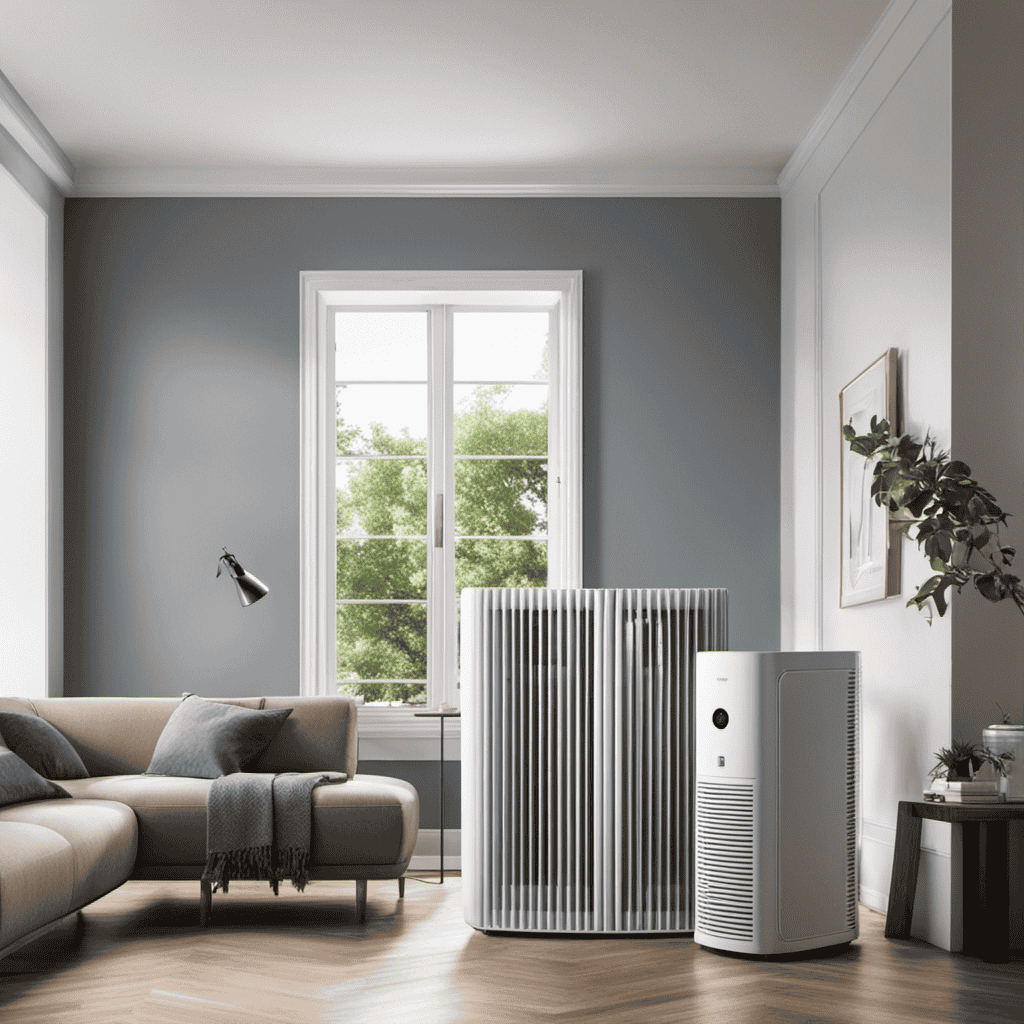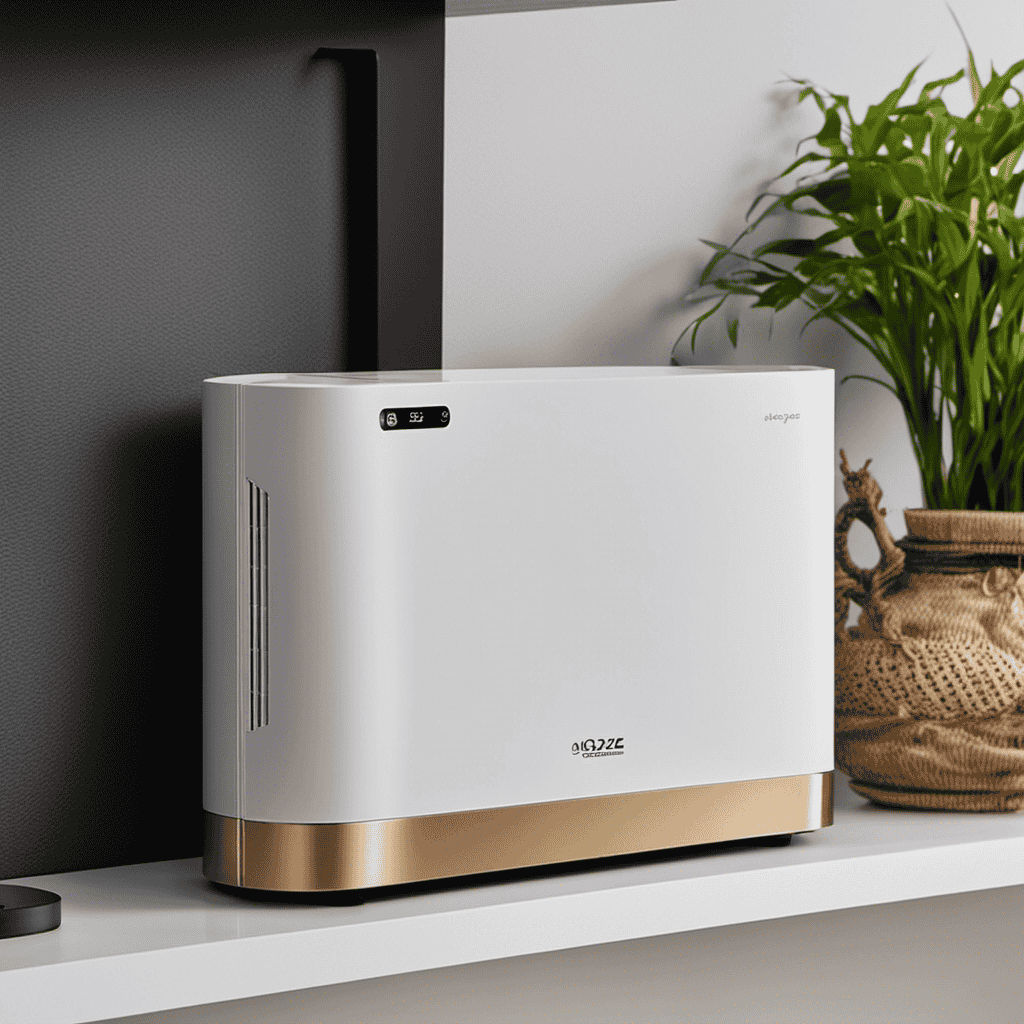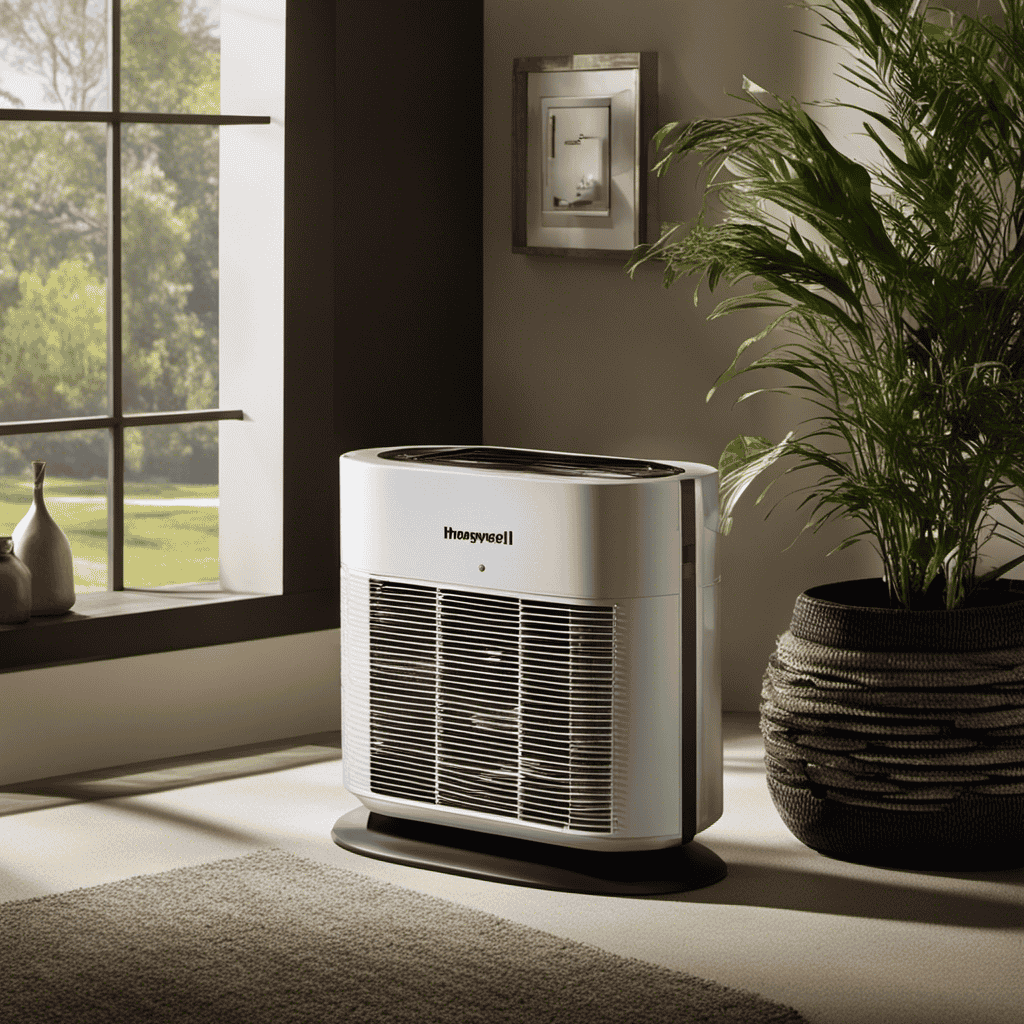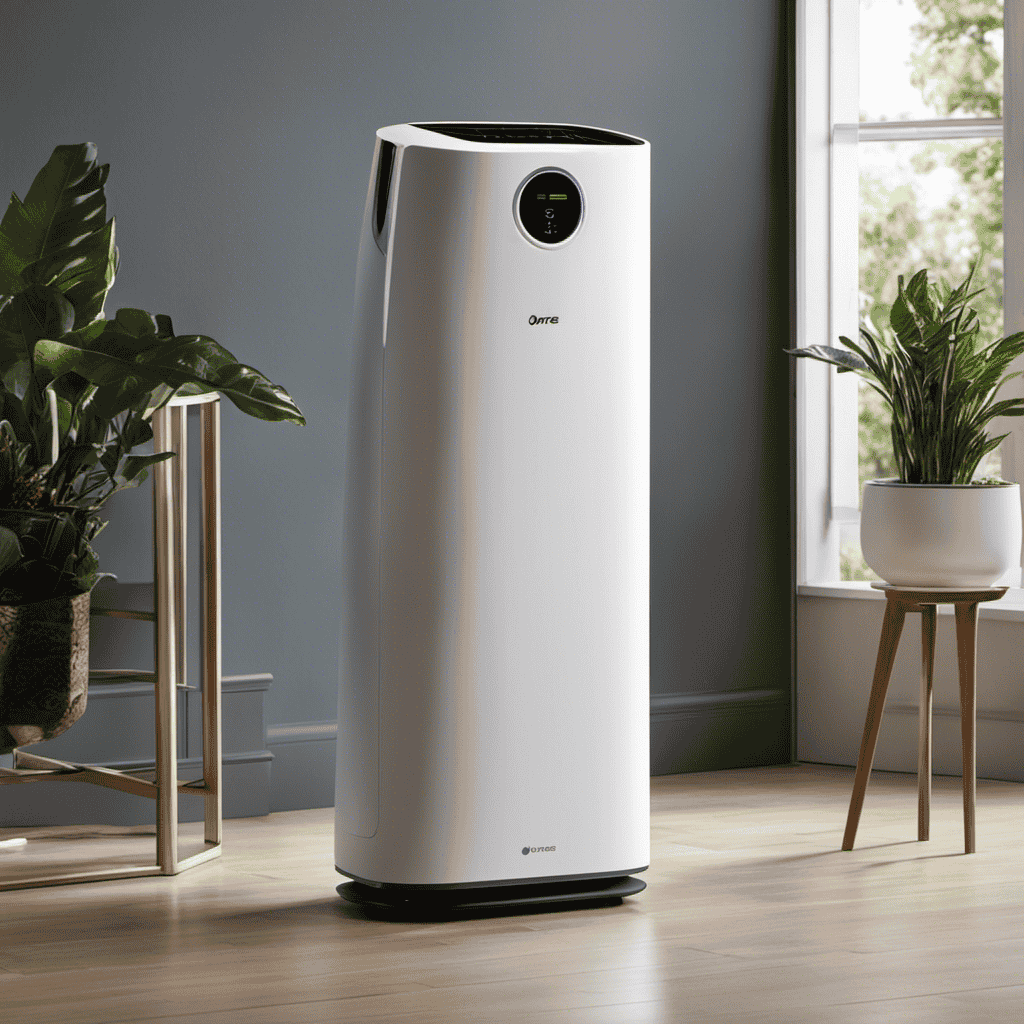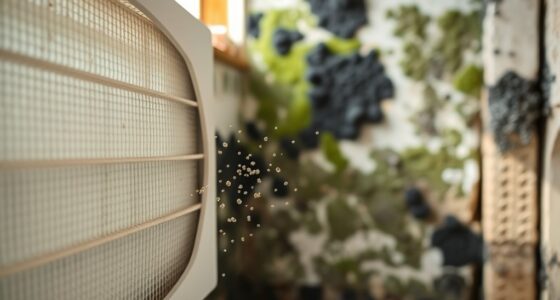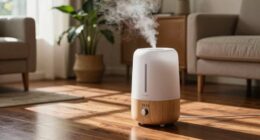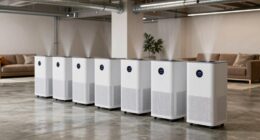As an individual aiming for pure and wholesome air inside, I frequently catch myself pondering: which is the superior choice, an air cleaner or operating the HVAC fan multiple times throughout the day? It’s akin to contrasting apples with oranges, each possessing their distinct advantages.
In this article, we will dive into the role of air purifiers in improving indoor air quality, explore the functionality of HVAC fans, and weigh the pros and cons of each.
So, let’s get down to the nitty-gritty and uncover which option reigns supreme for purifying the air we breathe.
Key Takeaways
- Air purifiers are highly effective at removing pollutants and allergens from indoor air.
- Running the HVAC fan several times a day improves indoor air circulation and reduces stagnant air.
- Air purifiers consume less energy compared to running the HVAC fan.
- The choice between an air purifier and running the HVAC fan depends on individual needs and priorities, considering factors such as filtration capability, energy consumption, and maintenance requirements.
The Role of Air Purifiers in Indoor Air Quality
Air purifiers can help improve indoor air quality by removing pollutants and allergens. They play a crucial role in ensuring that the air we breathe is clean and healthy.
One of the main benefits of using air purifiers is their ability to filter out harmful particles such as dust, pollen, pet dander, and mold spores. This is especially important for individuals with allergies or respiratory conditions. Proper air filtration is essential for maintaining a healthy living environment.
Air purifiers are equipped with filters that can efficiently trap these particles, preventing them from circulating in the air. By reducing the presence of these pollutants, air purifiers can help alleviate symptoms and improve overall respiratory health.
Understanding the functionality of HVAC fans is another important aspect to consider when it comes to maintaining indoor air quality.
Understanding the Functionality of HVAC Fans
To fully comprehend how HVAC fans work, you should familiarize yourself with their functionality and operation.
HVAC fans play a crucial role in indoor air purification. These fans are responsible for circulating air throughout the HVAC system, allowing the air to pass through filters and removing airborne particles, such as dust, pollen, and pet dander. By continuously running the HVAC fan, you can improve the indoor air quality by reducing the concentration of pollutants. This is especially beneficial for individuals with allergies or respiratory conditions.
Furthermore, HVAC fans also help to maintain consistent temperatures by distributing conditioned air evenly throughout the space. In addition to improving air quality, running the HVAC fan can also help to reduce humidity levels, prevent mold growth, and eliminate odors.
Overall, the benefits of HVAC fans in indoor air purification are significant, making them a valuable component of any HVAC system.
Comparing Air Purifiers and HVAC Fans: Pros and Cons
When comparing air purifiers and HVAC fans, you’ll find that each has its own set of pros and cons. Air purifiers are designed specifically to filter out pollutants and improve indoor air quality. They use various types of filters such as HEPA filters, activated carbon filters, and UV filters to trap and remove particles, allergens, and harmful contaminants from the air. On the other hand, HVAC fans are part of a larger system that circulates air throughout the building. While they may help improve air circulation, they do not have the same level of filtration capability as air purifiers. Additionally, HVAC fans consume more energy compared to air purifiers, which can lead to higher utility bills.
To better understand the differences between air purifiers and HVAC fans, let’s take a look at the following table:
| Aspect | Air Purifiers | HVAC Fans |
|---|---|---|
| Filtration Capability | High | Low |
| Energy Consumption | Low | High |
| Cost | Varies | Varies |
| Maintenance | Regular filter changes | Minimal maintenance |
As shown in the table, air purifiers have a higher filtration capability and consume less energy compared to HVAC fans. However, the cost and maintenance requirements can vary depending on the specific model and brand. Ultimately, the choice between an air purifier and running the HVAC fan several times a day depends on your specific needs and priorities, such as the level of air purification required and the energy consumption considerations.
Effectiveness of Air Purifiers in Removing Indoor Air Pollutants
One of the key factors in determining the effectiveness of air purifiers in removing indoor air pollutants is the type of filter they use. There are several types of filters commonly used in air purifiers, each with its own benefits.
-
HEPA (High Efficiency Particulate Air) filters are highly effective at removing airborne particles such as dust, pollen, and pet dander.
-
Activated carbon filters are great for reducing odors and capturing volatile organic compounds (VOCs).
-
UV-C filters use ultraviolet light to kill bacteria and viruses.
The effectiveness of air purifiers in improving indoor air quality has been supported by scientific studies. These devices can help reduce the levels of pollutants such as allergens, smoke, and mold spores in enclosed spaces, providing benefits for people with respiratory conditions or allergies. However, it is important to note that air purifiers are not a substitute for proper ventilation and regular cleaning.
Transitioning to the next section, running the HVAC fan can also play a crucial role in improving indoor air circulation.
Impact of Running the HVAC Fan on Indoor Air Circulation
You can improve indoor air circulation by regularly running your HVAC fan. However, it’s important to consider the impact this has on energy consumption. Running the HVAC fan can increase your energy usage and subsequently your utility bills. To help you make an informed decision, let’s compare the benefits of using air purifiers for people with allergies versus running the HVAC fan.
| Air Purifiers | Running HVAC Fan |
|---|---|
| Removes allergens such as pollen, dust, and pet dander | Improves air circulation, reducing stagnant air |
| Helps reduce allergy symptoms and improve respiratory health | Can be costly in terms of energy consumption |
| Filters air through HEPA filters, capturing even small particles | May not effectively remove all pollutants and allergens |
| Some models have additional features like UV lights to kill bacteria and viruses | Provides a constant supply of fresh air |
For people with allergies, air purifiers offer targeted filtration and can provide relief from allergens. However, running the HVAC fan can help circulate the air and reduce stagnant areas in your home. It’s important to find the right balance between energy consumption and air quality improvement.
Can a Humidifier Replace the Need for an Air Purifier in My Home?
Yes, a home air purifier vs humidifier can serve different purposes. While a humidifier adds moisture to the air, an air purifier removes pollutants and allergens. If you’re looking to improve air quality, an air purifier is essential. However, a humidifier can help with dryness but won’t address air pollution.
Frequently Asked Questions
Are Air Purifiers and HVAC Fans Equally Effective in Improving Indoor Air Quality?
Air purifiers and HVAC fans both improve indoor air quality, but they have different benefits. Air purifiers are more effective in reducing allergens, while running the HVAC fan is more cost-effective in terms of energy consumption.
Can Air Purifiers Remove All Types of Indoor Air Pollutants?
Air purifiers are highly effective in reducing allergens and removing all types of indoor air pollutants. They provide a cost-effective solution compared to running the HVAC fan several times a day.
What Is the Energy Consumption Difference Between Running an HVAC Fan and Using an Air Purifier?
Running the HVAC fan several times a day consumes more energy than using an air purifier. However, the effectiveness comparison depends on the specific pollutants present and the efficiency of both the HVAC system and air purifier.
Do Air Purifiers and HVAC Fans Have Any Impact on the Humidity Levels in a Room?
Using an air purifier or running the HVAC fan can both have an impact on room humidity. Air purifiers can help reduce humidity by removing moisture, while running the fan can circulate air and potentially decrease humidity levels.
Are There Any Health Risks Associated With Using Air Purifiers or Running the HVAC Fan Frequently?
There are health benefits to using air purifiers and running the HVAC fan frequently. They can help remove pollutants and allergens from the air, improving indoor air quality. Additionally, both options can be cost-effective in the long run.
Conclusion
In conclusion, after carefully examining the role of air purifiers and the functionality of HVAC fans, it is evident that both have their pros and cons.
While air purifiers are effective in removing indoor air pollutants, running the HVAC fan can greatly enhance indoor air circulation.
However, to choose between the two, it ultimately depends on individual preferences and specific needs.
Remember, ‘don’t judge a book by its cover’ – take into consideration the air quality concerns and make an informed decision based on what suits your situation best.
